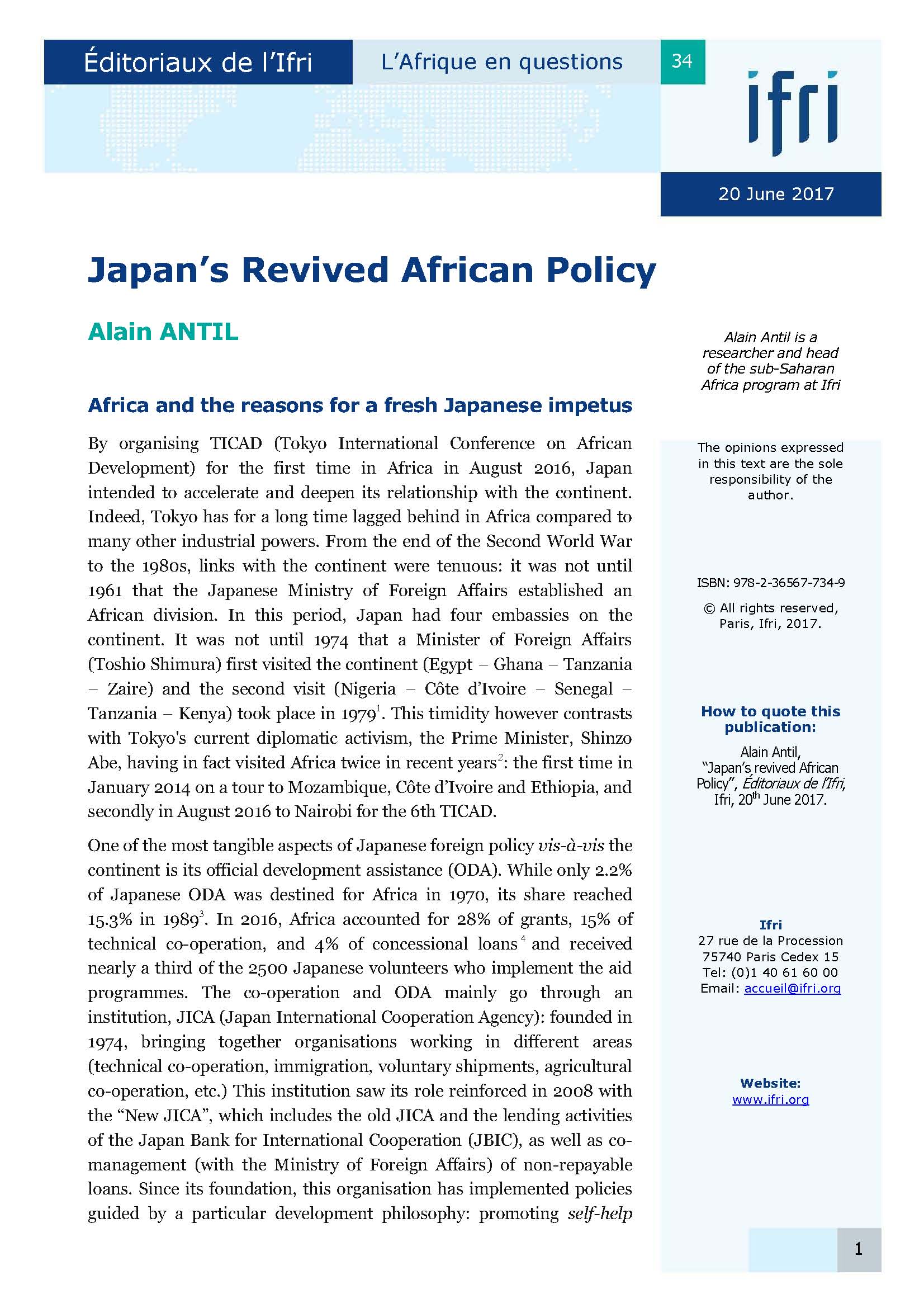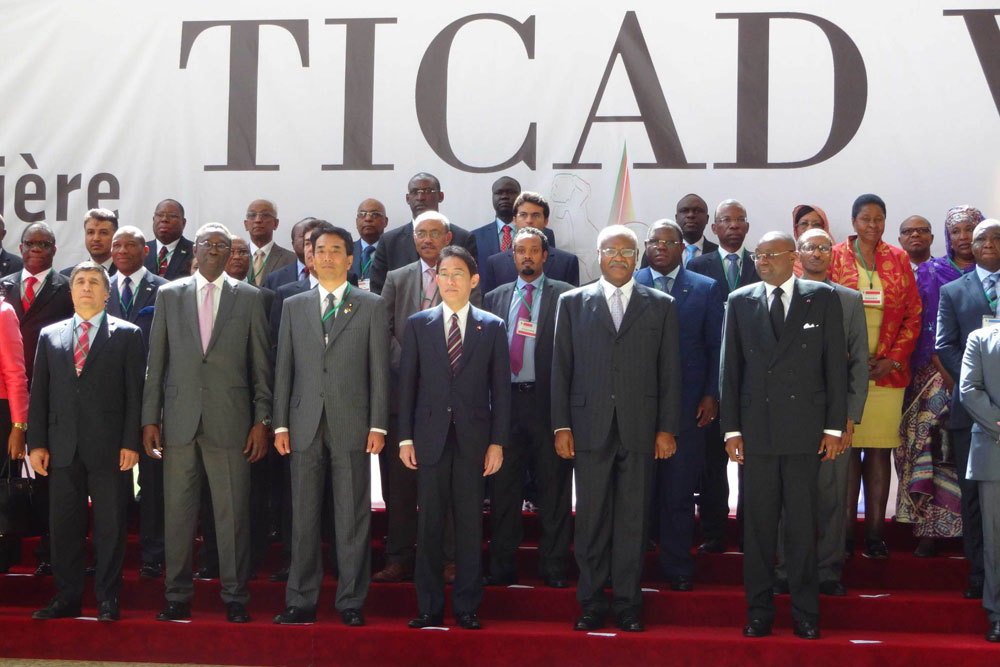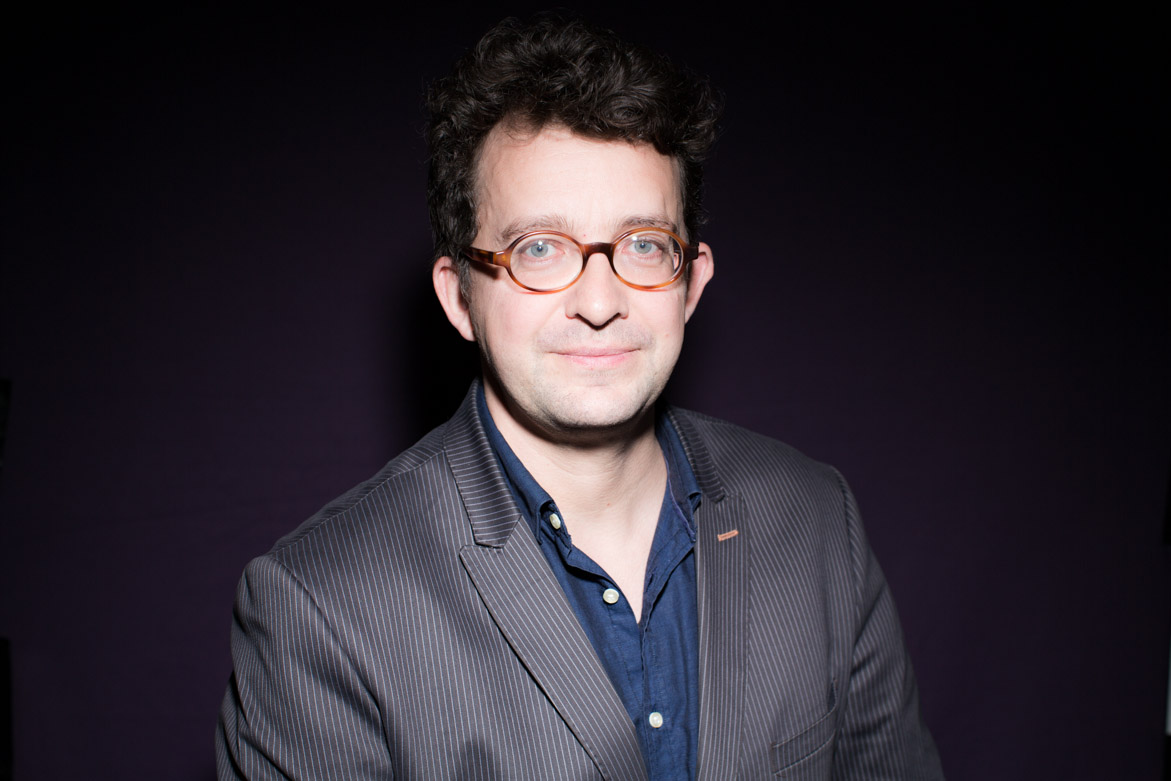Japan's Revived African Policy

By organising TICAD (Tokyo International Conference on African Development) for the first time in Africa in August 2016, Japan intended to accelerate and deepen its relationship with the continent.

Indeed, Tokyo has for a long time lagged behind in Africa compared to many other industrial powers. From the end of the Second World War to the 1980s, links with the continent were tenuous: it was not until 1961 that the Japanese Ministry of Foreign Affairs established an African division. In this period, Japan had four embassies on the continent. It was not until 1974 that a Minister of Foreign Affairs (Toshio Shimura) first visited the continent (Egypt – Ghana – Tanzania – Zaire) and the second visit (Nigeria – Côte d’Ivoire – Senegal – Tanzania – Kenya) took place in 1979[i]. This timidity however contrasts with Tokyo's current diplomatic activism, the Prime Minister, Shinzo Abe, having in fact visited Africa twice in recent years[ii]: the first time in January 2014 on a tour to Mozambique, Côte d’Ivoire and Ethiopia, and secondly in August 2016 to Nairobi for the 6th TICAD.
One of the most tangible aspects of Japanese foreign policy vis-à-vis the continent is its official development assistance (ODA). While only 2.2 % of Japanese ODA was destined for Africa in 1970, its share reached 15.3 % in 1989[iii]. In 2016, Africa accounted for 28 % of grants, 15 % of technical co-operation, and 4 % of concessional loans[iv] and received nearly a third of the 2500 Japanese volunteers who implement the aid programmes. The co-operation and ODA mainly go through an institution, JICA (Japan International Cooperation Agency): founded in 1974, bringing together organisations working in different areas (technical co-operation, immigration, voluntary shipments, agricultural co-operation, etc.) This institution saw its role reinforced in 2008 with the “New JICA”, which includes the old JICA and the lending activities of the Japan Bank for International Cooperation (JBIC), as well as co-management (with the Ministry of Foreign Affairs) of non-repayable loans. Since its foundation, this organisation has implemented policies guided by a particular development philosophy: promoting self-help (helping countries to do rather than doing things for them); working towards a favourable environment for development (for example by focusing on quality infrastructure or education); promoting loans rather than grants[v]. However, this development philosophy is not inconsistent with a commercial approach to Japan's African policy, co-operation to encourage, as far as possible, the establishment of Japanese companies on the continent. Today, the agency has 31 offices on the continent and in 2015 allocated JPY 50.8 billion in technical co-operation to Africa, JPY 204.9 billion in loans and JPY 40.3 billion in grants[vi].
Several reasons may explain this increased interest in Africa on Japan’s part: being active in a growth area on which the archipelago depends for a part of its raw material needs, but also to secure political support in the event of a reform of the UN Security Council where Japan is seeking a permanent members’ seat[vii].
For Tokyo, having allies on the continent, which accounts for more than a quarter of the world’s countries, is also valuable for example, when it comes to voting for sanctions against North Korea, or even for supporting a Japanese candidate for the leadership of an international institution. Finally, Japan is looking to assume the role of a world power by taking part in the development and security of an aspiring continent. Strategically, Tokyo is trying to counterbalance China's increasing power on the continent and is contributing to the security of the maritime route that passes to the east of Africa, which is crucial for the archipelago[viii].
TICAD: a flagship for Japan's African policy
TICAD is the key element in the archipelago's African policy. The first was organised in 1993, when Africa was undergoing a relative strategic downgrading, and its Western partners were turning away from the continent to help with development in Eastern Europe after the end of Soviet domination over these countries[ix]. For this reason, Japan led this initiative, as TICAD’s approach is not strictly bilateral[x], since from the first meeting, it has been customary to involve international organisations (United Nations, United Nations Development Programme, Organisation of African Unity then the African Union, World Bank, etc.), as well as national partners (United States, United Kingdom, France, South Korea, etc.) As the Japanese authorities like to point out, the two principles promoted by TICAD are “Africa ownership” and “international partnership”. Every five years, a summit was held in Japan, firstly on development, agriculture and healthcare issues, and then subsequently extended to trade, investment, human security, resilience, or environmental issues.
Companies appeared at the third TICAD (2003). The fourth TICAD was held in Yokohama (and no longer in Tokyo), a port in the archipelago with a strong interaction with Africa, and has established an increasingly “business-oriented” character for the event. The sixth TICAD (2016) marked a new turning point, since Tokyo decided to accelerate the pace of the meetings (every three years instead of every five years), and to hold the meeting on the African continent (Nairobi) for the first time. This sixth TICAD was marked by the large presence of the Japanese private sector (200 companies present) and by the number of parallel economic events, including an exhibition of Japanese companies or even a Franco-Japanese summit meeting[xi]. At the end of this TICAD, Prime Minister Shinzo Abe, committed Japan to investing even more in Africa. At the same time, 73 Memoranda of Understanding (MOU) were signed between companies and countries. TICAD, originally a development forum, over time has turned into a tool for promoting the private sector as a development actor and reflects Japan's economic interest in the continent.
Japanese economic presence[xii]
The first Japanese companies to set up in Africa were the trading houses (sogo shosha), some of which have been there since before the Second World War. This presence would be emphasised by the transformation of the Japanese economy in the 1970s, moving from a heavy industrial model to a model firmly focused on cutting-edge technologies, and the need for certain minerals leading some Japanese companies to set up on the continent[xiii] and particularly in South Africa.
In a presentation given by the Japanese ambassador to France, Ichiro Komatsu, in 2013, the latter stated that Japan imported 77.8 % of its rhodium, 71.8 % of its platinum, 58.4 % of its palladium, 47.4 % of its chrome, and 46.1 % of its manganese needs from Africa. This interest in African raw materials is found in the pattern of trade for the years 2013, 2014 and 2015, with imports of oil and solid mineral fuels (42.3 %), metals and precious stones (19.4 %), minerals (7.3 %), and seafood products (3.4 %)[xiv]…
Like most of Africa’s trading partners, Japan therefore imports unprocessed or limited processed products and sells manufactured products (mainly vehicles, machinery and boats). Although trade (still in deficit for Japan) has fluctuated between $ 20 billion and $ 34 billion over the period 2006-2014, it is highly concentrated geographically. Hence, for 2011-2015, Japanese exports were largely (70 %) to five countries (South Africa 31.5 %, Egypt 15 %, Kenya 10.8 %, Liberia 10.2 %, and Nigeria 4.2 %). There was an even higher concentration for Japanese imports, since three countries account for more than 70 % (South Africa 42.8 %, Nigeria 24.5 %, and Algeria 8 %)[xv].
More than 500 Japanese companies are present in Africa and Japan is one of the main investors on the continent ($ 10 billion in 2014), even if it is far from being in the top four[xvi]. Although over the last 10 years, investment has significantly increased, Japanese-African trade statistics show no particular boom. The high-end production from the archipelago is in fact just not suited to African consumers’ purchasing power. However, tenders from Japanese companies are more suited to the needs of companies on the continent, state-owned companies or to countries (procurement contracts).
The obstacles to this policy
However, several factors seem to be able to inhibit this impetus for Africa. Firstly, security issues are a major obstacle to sending Japanese expatriates. The difficulty is twofold: on the one hand, institutions and companies must take drastic measures to ensure that their employees can be deployed; on the other hand, Africa unfortunately has a less than flattering image in the Japanese imagination and the emergence of Salafi-Jihadism on the continent has only reinforced this perception of a continent fraught with danger. The trauma of the attack at In Amenas (Algeria) in January 2013, in which 10 Japanese nationals lost their lives, is still raw. This excessive fear of endangering their employees is coupled with extreme discomfort at the idea that a hostage-taking or an assassination may jeopardize or politically inconvenience the Japanese authorities. This security tension affects the ability to send expatriates, and when they are in situ, affects their ability to discover the country or to lead a social life with the locals, which reduces their knowledge of the country.
The second point is precisely expertise. Almost all of our interviewees[xvii] complained about the inadequate coverage of African news by the Japanese media. Unlike other powers present in Africa with a large network of journalists from news agencies (AFP, Reuters, AP, Xinhua, etc.), Japan is very dependent upon information produced elsewhere. Finally, the existing expertise in Japan seems rather dispersed. It can be considered that there is an initial group, with on the one hand JICA and a majority of academics, where there are many people who have a good knowledge of the field, but fields dedicated to research and development, humanities and agriculture. Furthermore, a number of academics are former JICA employees or volunteers. In a second group, are companies, JETRO, and then the ministries most connected with the continent (mainly the Ministries of Economy and Foreign Affairs), as well as some university economists or think tank researchers (Japan Institute of international Affairs or NIDS for example) who have a more comprehensive and political approach, but are perhaps less connected to the field.
It is important that these two areas are able to interact smoothly, although obviously, they can cross over in some places such as in GRIPS[xviii], IDE JETRO[xix] and in some JICA activities. A certain number of officials we met, focused for example, on the lack of knowledge of the Western and Central African areas, and more generally, on a lack of French-speaking Japanese to be expatriated to these countries, as Japan hopes to be active in all of sub-Saharan Africa.
The companies we met identified two negative points in the expertise available in Japan. The first is the lack of understanding of the political context in many African countries, which undermines the ability to understand major trends or to anticipate reversals in fiscal or trade policies for example. This can lead to greater difficulty in winning procurement contracts. The second is the limited ability of Japanese expertise to propose relevant interpretations of major social or societal developments, both at national and continental level.
Finally, while the Japanese authorities have made progress in supporting companies setting up on the continent, this support remains insufficient. The companies we met, all praised the increase in investment protection agreements, the work of Nippon Export and Investment Insurance (NEXI) or support provided by JETRO, while regretting that the latter institution does not have enough offices in Africa (7 for now[xx]). This aspect is obviously essential, particularly for the SME/SMIs which have to be supported more than the large groups.
Japan belongs to those countries which have developed an ambitious African policy since the end of the Cold War. The great strength of this policy is consistency, due in particular to the very small number of public institutions involved, which furthermore have a very wide role. But the limitation of this policy is the relatively low level of African expertise found in Japan, and which reinforces the tendency to an overly cautious approach, both politically or economically.
[i]. See Julien Kita: L’Aide publique au développement japonaise et l’Afrique : vers un partenariat fructueux ?, Asie Vision No. 10, Ifri, September 2008.
[ii]. Three times if his Egyptian stage during his trip to the Middle East in January 2015 is included.
[iii]. A completely different volume of assistance, since it was $ 243 million in 1965 compared to $ 14 billion in 1995, see Julien Kita, ibid., p. 3.
[iv]. According to Professor Akihiko Tanaka (University of Tokyo) and Charles Boamah (African Development Bank), see: « Le Japon, un modèle de coopération avec l’Afrique ? »”, in Le Monde, 11 August 2016.
[v]. Interview conducted at JICA’s headquarters, Tokyo, January 2017.
[vi]. Ibid.
[vii]. Interview conducted at the Ministry of Foreign Affairs, Tokyo, January 2017.
[viii]. For these issues, see Céline Pajon: Japan’s Security Policy in Africa. The dawn of a strategic approach?, Note de l’Ifri, Ifri, May 2017.
[ix]. Different interviews at the Ministry of Foreign Affairs, Tokyo, January 2017.
[x]. Unlike the other “forums” which were then set up: China, India, South Korea, Turkey, etc.
[xi]. “Joint event on the France-Japan Partnership for Africa.”
[xii]. For this section and the following one, some parts were gathered during an interview given by Ms. Asako Ueno (Director for African Affairs, Trade Policy Bureau, Ministry of Economy, Trade and Industry) and her team.
[xiii]. See Jun Morikawa: Japan and Africa. Big Business and Diplomacy, Africa World Press, 1997, 298 p.
[xiv]. The preceding numbers come from the Japanese customs and are available in a JETRO document (Japan-Africa Economic Relations, 2016)
[xv]. Ibid.
[xvi]. United States $ 64.23 – United Kingdom $ 59.31 – France $ 51.85 – China $ 32.35.
[xvii]. During a stay in Tokyo, during which the interviews were conducted both with academics, officials in the different Ministries and companies, or even with institutions such as JICA or JETRO.
[xviii]. National Graduate Institute for Policy Studies.
[xix]. Institute of Developing Economies, Japan External Trade Organisation, Tokyo.
[xx]. During an interview in Tokyo in January 2017, Katsumi Hirano, Vice-President of JETRO, emphasised that for 10 years, JETRO has been increasingly solicited by companies wanting to set up in Africa or already established there: “They want more concrete support about the customs rules or more generally about local regulations.”

Available in:
Regions and themes
Share
Download the full analysis
This page contains only a summary of our work. If you would like to have access to all the information from our research on the subject, you can download the full version in PDF format.
Japan's Revived African Policy
Related centers and programs
Discover our other research centers and programsFind out more
Discover all our analysesAnglo-Kenyan Relations (1920-2024) : Conflict, Alliance and a Redemptive Arc
This article provides an evidentiary basis for postcolonial policy in its analysis of Anglo-Kenyan relations in a decolonization era.
When City Diplomacy Meets Geopolitics: A Framework to Help Cities Navigate Geopolitical Risk
Crises and the increasing polarization of international relations make political risk analysis an indispensable resource for internationally active public and private entities.
The United Nations Mission in Congo or the exemplary uselessness of the United Nations peacekeepers
During the M23 conflict in 2012-2013 in the Democratic Republic of Congo (DRC), the United Nations (UN) took the diplomatic initiative (by initiating the Addis Ababa agreement) and the military initiative (by launching a coordinated counter-offensive with the Congolese army). Since the resurgence of this conflict in 2022, the United Nations, which still has more than 10,000 peacekeepers deployed in eastern DRC, no longer plays any role.
Rebooting Italy's Africa Policy: Making the Mattei Plan Work
Against the backdrop of increasing anti-French rhetoric across parts of Francophone Africa, the relative failure of the counterinsurgency operation in the central Sahel (Operation Barkhane) and diplomatic rifts with several Sahelian countries, Paris has been rethinking its relationship with the continent for several years now. As a former imperial power that has seen its colonial domain in Africa gain independence between 1956 (Morocco-Tunisia) and 1977 (Djibouti), France has invented two successive roles for itself in Africa since 1960, particularly in French-speaking sub-Saharan Africa.










